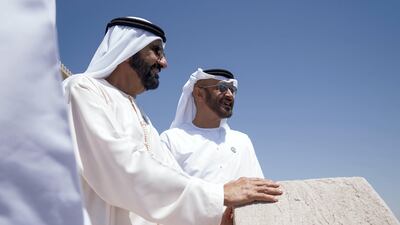For many in the UAE, especially in Abu Dhabi, this has been a summer bookended by economic stimulus and road safety measures.
In June, the Executive Council announced a sweeping Dh50bn stimulus package for the emirate over the next three years.
The measures, launched by Sheikh Mohammed bin Zayed, Crown Prince of Abu Dhabi and Deputy Supreme Commander of the Armed Forces, under the guidance of Sheikh Khalifa, the UAE President, were innovative and broad: a relaxation of licensing rules governing offices and work spaces; the establishment of Ghadan, an accelerators' council designed to identify and nurture what can be loosely termed the future economy; increased employment opportunities for young people in both the private and public sector over a sustained period; support for SMEs and clarity over freezone worker status –the list goes on.
All this has to be delivered with speed. Officials have been given just 90 days to draw up effective strategies to implement the stimulus programme and the clock has now ticked past the 60-day mark. But it is pace of a different nature that currently occupies the minds of many who live in Abu Dhabi.
This week, the speed buffer on the city's main roads was removed. Abu Dhabi Police, the department of transport and the urban planning department are confident that the cancellation of the buffer will reduce incidents of speeding and promote greater road safety.
Anecdotally, at least, the first few hours after implementation appeared to foster better driver behaviour on the roads. Long may it last.
The season has also been marked by a series of statements by the most senior members of the Cabinet. These pronouncements – on youth, education and governance, all delivered within the past four weeks – provide us with a rough sketch of the nation and fit neatly with the summer narrative of economic stimulus and speed.
At the end of last month, Sheikh Abdullah bin Zayed, Minister of Foreign Affairs and International Co-operation, issued what amounted to a rallying cry to young university graduates, telling them that "all our country wants is for you to stand out, in life, to learn, develop and compete with your counterparts from around the world.
“It is education that makes great nations and lifts them among others like stars that shine in the universe. This is why education was, and still is, one of our top priorities in the UAE.”
He went on to say that "it is your right to not get a degree, but it is not your right to not learn".
The key message here was that education, which has always been a priority since the Founding Father Sheikh Zayed began his nation-building work, is not the destination itself.
The challenge for the country's young people is to use their education. They have even greater opportunities than those who walked before them, for the continued development of the UAE.
It is also obvious that they must look beyond the traditional entry points to the workplace, such as Government departments and ministries. The Executive Council’s stimulus programme, with its broad emphasis on the future economy, small business and creativity, supports that ambition.
This week the country marked International Youth Day and Sheikh Mohammed made it clear that young people will be helped on that journey towards the frontier of the modern workplace. In statements on social media, the crown prince said the late Sheikh Zayed had placed confidence in young people, establishing a “solid relationship” in the process. Indeed, that “absolute faith” remains in place today.
The crown prince also announced the UAE Youth Global Initiative. At the launch this week, he emphasised that young people need to invest in skills to make sure they are able to properly contribute to society. He reminded those at the event that "we are in a constant race with the world".
Again the message is clear. The Government will provide help for young people but that assistance must be matched by a desire for self-improvement. There is a strong element of self-determination evident here, buttressed by a leadership that is aware of the challenging issues that are present in our region today.
Last week Sheikh Mohammed bin Rashid, Vice President and Ruler of Dubai, also took to Twitter, discussing the “crisis of management” that presents itself across the Middle East. While he did not reference any specific nation or bloc, he went on to say that "a politician’s true job is to facilitate people's lives, and solve crises, not create them”.
Taken together, all of these statements suggest continued focus on youth development and a recognition that, as Sheikh Mohammed bin Rashid said, "empty speeches” and “meaningless words" do not carry a nation forward, while effectively saying that dedication to action and policy does.
The youth initiative and the stimulus package are evidence of that commitment.
This month also witnessed the anniversary of Sheikh Zayed assuming the role of Ruler of Abu Dhabi in 1966. Complex challenges stood in his way back then and the future of this part of the Gulf was by no means assured more than 50 years ago.
Such obstacles required economic development and clarity of thought – stimulus and speed of implementation, if you will – to stir what was once a relatively small trading outpost into the modern country we recognise now. The hurdles might be different today but the same prescription remains remarkably apposite.
Nick March is an assistant editor-in-chief at The National


